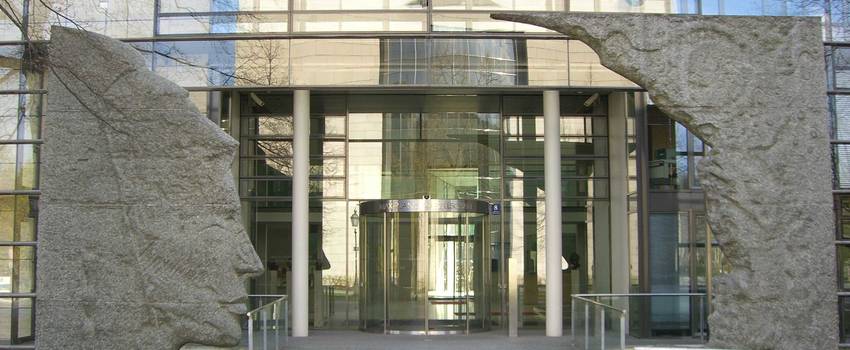Leonhard Schilbach Which Neural Mechanisms Are Taking Place During Social Interaction of Individuals?
Leonhard Schilbach is the Head of the Clinic for Disorders of Social Interaction, Consultant Psychiatrist and Research Group Leader at the Max Planck Institute of Psychiatry in Munich, Germany as well as a consultant psychiatrist and lecturer at the Medical Faculty of the University of Cologne, Germany. His major research interests are social neuroscience where he uses experiments and other empirical approaches to explore how human beings understand and make sense of each other. For his research Schilbach has been awarded the Hans-Heimann-Prize from the German Association for Psychiatry, Psychotherapy and Psychosomatics (DGPPN) and the Barbara-Wengeler-Prize.
Area of Research
Social Neuroscience, Experimental Paradigms
since 2015
Consultant Psychiatrist, Head of Clinic for Disorders of Social Interaction and Research Group Leader
Max Planck Society (more details)
Max Planck Institute of Psychiatry
since 2014
Consultant Psychiatrist
University of Cologne (Universität zu Köln)
Medical Faculty
since 2013
External Tutor for a PhD Program in Neuroscience
University of Turin (Università degli Studi di Torino)
since 2013
Lecturer in Experimental Psychiatry/Social Neuroscience
University of Cologne (Universität zu Köln)
Medical Faculty
2011-2013
Scientific Researcher
Max Planck Institute for Neurological Research
2014
Board-Certified Medical Specialist
Psychiatry and Psychotherapy
2012
Habilitation
University of Cologne (Universität zu Köln)
Medical Faculty
2008
MD (Dr. med.)
University of Cologne (Universität zu Köln)
Medical Faculty
2006
State Exame in Medicine
Dresden University of Technology (Technische Universität Dresden)
Ernst-Moritz-Arndt Universität Greifswald, University College London and Johns Hopkins University School of Medicine
- Behavior Research Methods, Psychonomic Society
- Biological Psychiatry, Elsevier
- Biological Psychiatry: Cognitive Neuroscience & Neuroimaging, Elsevier
- Biology Letters, Royal Society Publishing
- Brain Structure & Function, Springer
- British Journal of Psychiatry, RC Psych Publications
- Cerebral Cortex, Oxford Journals
- Child and Adolescent Psychiatry and Mental Health, BioMed Central
- Cognition, Elsevier
- Cortex, Elsevier
- Cognitive Science
- Cognitive Neuroscience, Psychology Press
- Current Directions in Psychological Science, Blackwell Publishing
- Current Biology, Cell Press
- Emotion, APA
- Experimental Brain Research, Springer
- Fortschritte der Neurologie und Psychiatrie, Thieme Verlag
- Frontiers in Human Neuroscience, Frontiers Media
- Frontiers in Psychoanalysis & Neuropsychoanalysis, Frontiers Media
- Human Brain Mapping, Wiley
- Journal of Autism and Developmental Disorders, Springer
- Journal of Neuroscience, Society for Neuroscience
- Journal of Neuroscience, Psychology & Economics, APA
- Journal of Psychophysiology, Hogrefe
- Nature Reviews Neurology, NPG
- Neuropsychologia, Elsevier
- Neurocase, Psychology Press
- NeuroImage, Elsevier
- Neuroinformatics, Springer
- Perspectives on Psychological Sciences, Sage
- Phenomenology & Cognitive Sciences, Springer
- Philosophical Psychology, Taylor & Francis
- PLoS ONE
- PLoS Biology
- Presence, MIT Press
- Proceedings of the National Academy of Science
- Psychiatry Research - Neuroimaging, Elsevier
- Psychological Medicine, Cambridge Journals
- Psychological Science, Sage
- Psychonomic Bulletin & Review, Thomson Reuters
- Psychophysiology, Wiley
- Review of Philosophy & Psychology, Springer
- Reviews in the Neurosciences, de Gruyter
- Royal Society Publishing
- Schizophrenia Bulletin, Oxford Journals
- Scientific Reports, Nature, NPG
- Social Cognitive and Affective Neuroscience, Oxford University Press
- Social Psychological and Personality Science, Sage
- Synthese
- Trends in Cognitive Sciences, Cell Press
- Cognitive Neuroscience Society (CNS)
- Deutsche Gesellschaft für Psychiatrie, Psychotherapie und Nervenheilkunde (DGPPN)
- Deutsche Gesellschaft für Biologische Psychiatrie (DGBP)
- European Platform for Life Sciences, Mind Sciences and the Humanities, Volkswagen Stiftung
- European Society for Cognitive and Affective Neuroscience (ESCAN)
- Organization for Human Brain Mapping (OHBM)
- Society for Neuroscience (SfN)
- Society for Social Neuroscience (S4SN)
Prizes
- Barbara-Wengeler-Preis, Barbara-Wengeler-Stiftung (2013)
- Best Paper Award, Gesellschaft für Kognitionswissenschaften (2010)
- Hans-Heimann-Preis, Deutsche Gesellschaft für Psychiatrie, Psychotherapie & Nervenheilkunde (2009)
 © Maximilian Dörrbecker
© Maximilian Dörrbecker
Max Planck Society
"The Max Planck Society is Germany's most successful research organization. Since its establishment in 1948, no fewer than 18 Nobel laureates have emerged from the ranks of its scientists, putting it on a par with the best and most prestigious research institutions worldwide. The more than 15,000 publications each year in internationally renowned scientific journals are proof of the outstanding research work conducted at Max Planck Institutes – and many of those articles are among the most-cited publications in the relevant field." (Source)
Institute
Max Planck Institute of Psychiatry
"The Max Planck Institute of Psychiatry, which focuses primarily on research into depression and anxiety disorders, is one of the world's leading institutes in this field. Here, basic research is closely interlinked with clinical research: the Institute incorporates a 120-bed hospital, numerous specialist outpatient departments and a day unit. Within these facilities, the modern research branches of genetics and proteomics are combined with the clinical analysis techniques of imaging and the measurement of brain function. The aim is to identify biomarkers of psychiatric and neurological disorders in a bid to better understand the molecular basis of these diseases. The knowledge obtained goes into the development of new therapies and drugs for the personalised medicine of tomorrow." (Source)
Map
The studies presented in this video show that a focus on social interaction in neuroscience helps to examine the neural mechanisms that are at work in human brains during social interaction. Using a combination of fMRI and eye-tracking, the brain activity during social interaction is observed. As LEONHARD SCHILBACH explains, intact brain mechanisms reward social interaction and thus evoke intrinsic motivation. The new method can help to understand the neurobiology of psychiatric disorders and to make progress in their treatment.
LT Video Publication DOI: https://doi.org/10.21036/LTPUB10165
Toward a Second-Person Neuroscience
- Leonhard Schilbach, Bert Timmermans, Vasudevi Reddy, Alan Costall, Gary Bente, Tobias Schlicht and Kai Vogeley
- Behavioral and Brain Sciences
- Published in 2013









